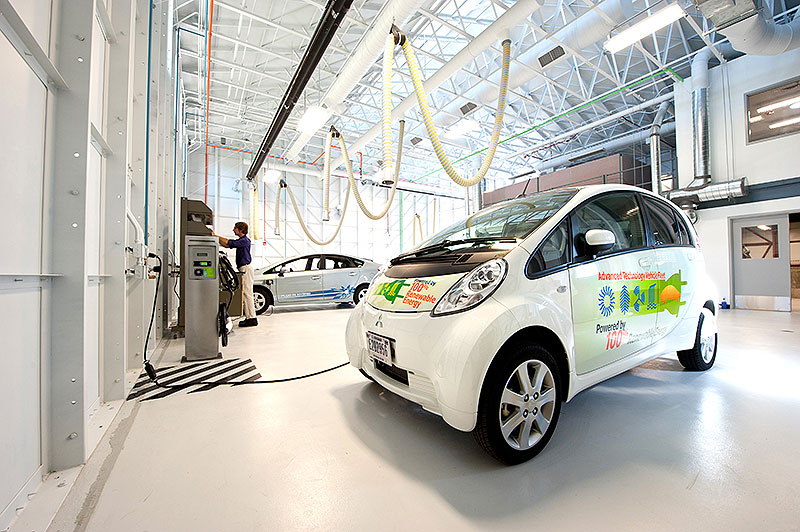A sure as night follows day, you can count on electric vehicle (EV) critics to turn generally positive comments regarding the environmental impact of EVs into negative ones. The study that critics refer to, Life cycle air quality impacts of conventional and alternative light-duty transportation in the United States, is authored by three engineering professors at the University of Minnesota and published recently in the Proceedings of the National Academy of Sciences. The study reinforces most of what wind power and EV advocates thought all along, that the technologies (wind and EVs) are advantages to health and air quality, but more to that point later.

NREL scientist Michael Kuss of the NREL Electric Vehicle Grid Integration Team reads data from test electric vehicles at the Vehicle Testing and Integration Facility. What’s more, EVs charged by wind power, as they would likely be in Colorado, California, or Texas, provide the cleanest personal transportation available, according to the report.
The great delight the critics took from the report is one unsurprising comment, that an electric vehicle charged by coal-fired generation “increases monetized environmental health impacts by 80% or more relative to using conventional gasoline.” Based on that alone, several stories bounced around the internet with the headline that essentially read: Electric vehicles worse than gasoline powered cars for environmental health. Now if EVs critics would like to rail against coat-fired generation, have at it. But that was not the thrust of the report.
In a nutshell, the authors examined 10 drivetrain scenarios, such as conventional hybrids, diesel, natural gas, ethanol, and EVs charged by several generation sources and drew conclusions as to which has the most and least environmental health impact. To illustrate how easily critics are distracted, here is the sentence in the abstract (first page, first paragraph) that follows the one quoted above and which critics chose to ignore: “Conversely, EVs powered by low-emitting electricity from natural gas, wind, or solar power reduce environmental health impacts by 50% or more.”
And that should have been the source of the headlines. Something like: Cleanest transportation is an EV powered by wind, and all home grown.
When you have to deceive to make a point, you’re on the wrong side of the argument.
–Paul Dvorak
Filed Under: News





You are incorrect about the range of the Nissan LEAF. Your estimate of a 20-30 mile range is absolutely wrong. Even if I only charge my LEAF to 80% of its capacity, its range is over 60 miles, even with heat or AC. There is a more significant drop in range with cold temperatures but probably to 45 miles on an 80% charge. I think it is misleading to suggest that a 200 mile trip is an “everyday” trip. The LEAF’s range is well within the requirement of most people’s actual everyday needs. A LEAF may not be a practical option for a single car family but I suspect most American families have more than one car. We use our Prius for out of town trips.
There are definitely people who’s lives don’t currently work for EV cars, such as the example above. I personally won’t buy an EV car until I can afford solar panels also. Charging batteries in your EV car with electricity generated by burning coal is ignorant in the first place and never made any sense to me. I see so many people smiling in front of their car thinking they’re doing something good and ask myself, where do they think their electricity comes from. I am studying alternative energy engineering in college now and am all for green, renewable, sustainable practices in everything we do. Just wish more people understood the reality of their situations.
While you might not like that reality it is reality. An EV charged by electricity produced by a coal fired plant produces more pollution than the pollution produced by a modern internal combustion engine over the same distance. The reason that is an issue in the U.S. is 60% or more of elctricity produced is from coal fired plants. As we all know coal fired plants produce alot of pollution.
With that said, there are alot of things holding back the introduction of EVs on a larger scale but how the electricity is produced isn’t one of them. For most consumers its going to be cost, duration and having long charging cycles that deter them from buying an EV.
Realistically my wife could care less how her car is powered. She wants to get in it, turn the key and go where she wants. If that’s the store or half way across the country she doesn’t care. If the car she drives has to stop and spend 4-5 hours charging every 150 miles she not going to be happy.
The Nissan Leaf claims an 80 mile range but if you turn on the heater or A/C the range drops to between 20-30 miles. That not practical for most people. If I only have one car and I want to go see grandma who lives 200 miles away I want it to take me 3.5 hours. There isn’t an affordable EV on the market that could do that simple everyday trip in less than twice that amount of time because I have stop and charge the batteries. Yes, most poeple don’t drive 150 miles in their daily activities but I may need to and I only have one car.
If you think I don’t look forward to the day when EVs are practical your wrong. I do alot of engineering type work. Much of what is done in engineering is overcoming hinderances. The hinderances to a practical EV will be overcome. That includes producing most of the world’s electricity using fossil fuels. In the mean time supporters wanting to push the introduction of EVs forward more quickly are going to have to except reasonable people looking at Evs reasonably aren’t going to agree with them in regards to their current practicality.